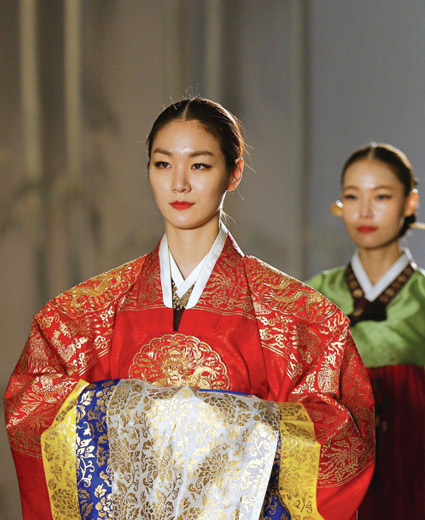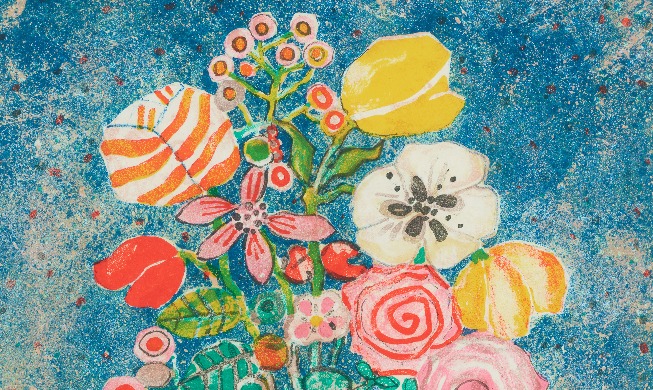-
 Korea.net's 24-hour YouTube channel
Korea.net's 24-hour YouTube channel- NEWS FOCUS
- ABOUT KOREA
- EVENTS
- RESOURCES
- GOVERNMENT
- ABOUT US

By Ophelie Surcouf
Freelance journalist from France
Countries in the West including France were surprised over how the original Netflix series "Squid Game," which has earned immense global success, was made in Korea. Yet Korea began reinforcing the basis for cultural success decades ago before setting world records a few years ago.
In 2019, BTS became an international sensation on the world stage. Last year, "Parasite" by director Bong Joon-ho won four Oscars, including that for Best Picture, at the 92nd Academy Awards of the U.S. So what is the secret behind Korean content that has captivated people around the globe?
K-content: decades of popularity
Since the 1990s, Korean dramas have proven immensely popular in Asian countries including China, Japan, Malaysia, Indonesia and Vietnam. In the 2000s, the export of Korean soap operas began to nations in Africa, the Middle East and South America. One of them, the historical series "Jewel in the Palace" (2003), saw a phenomenal viewer rating of over 90% in Iran for each episode in 2007.
The international boom of "Hallyu" (Korean Wave) has fueled the development of Korea's content industry. Broadcasters have earned more profit through investment in content-related projects and sales of their content's distribution rights overseas. This prompted quick production of mini-series spanning 16-20 episodes and upgrades in the visual quality of K-dramas, which had been hailed earlier as having higher quality than those of neighboring countries.
"Perfection" aesthetics exclusive to Korea
Another secret behind Hallyu's success is the pursuit of perfection, a characteristic easily found in many sectors of Korean society. K-pop music videos made with nanoscale-level details clearly show the degree of perfection in all aspects of production, including the act's flawless styling and dance, stage display, lighting, camera movements and images that all combine to express powerful rhythms. Each of these factors creates a harmony of calm and excited, static and dynamic, and dark and bright. These qualities are also found in the marketing of Korean products such as those of Korean fashion and beauty.
Characters full of personality
Hallyu characters are unique. Since the early 2000s, many culture industries in Korea have created many icons. In K-pop, each act sets its own concept to reflect in its music, dance and stage performance to express the personality of each member, attracting fans and creating a global sensation. Popular cartoon characters like Pororo or Pucca have gone international by appearing in the designs of many products. And K-dramas have also gained huge popularity from those seeking alternatives to Hollywood-style narratives by showing fresh characters that avoid cliche.
Unprecedented global fandom
Fans not only consume content but also do their part to actively spread Hallyu around the world. They have formed online communities for each Korean content and celebrity they love, something fans of the "Marble" or "Harry Potter" series have not done. As seen by BTS fans who raised USD 1 million for the "Black Lives Matter" campaign of the U.S., K-pop showed the influence of Hallyu in areas other than culture.
Charm of Korean: driving Hallyu
The Korean language might receive less attention than Hallyu, but is undoubtedly a leading driver of the Korean Wave. Learning a language takes a lot of time and effort, but narrows cultural gaps and promotes better understanding of another culture.
Hangeul is easy to learn and enables numerous expressions depending on manner of writing. Thanks to these strengths, many have experienced the charms of Korean culture through Hangeul handwriting or calligraphy. In France, for example, the number of students of Korean studies at universities including Paris 7, La Rochelle and Inaldo jumped from 500 in 2007 to 1,300 in 2011, and that of students enrolled at King Sejong Institute in Paris nearly doubled to 1,624 last year from 867 in 2018. In the wake of the global smash "Squid Game," the number of people studying Korean through the language learning app Duolingo surged 50%.
In October this year, the BTS-Coldplay collaborative song "My Universe" topped Billboard's Hot 100 main singles chart. More recently, another Netflix original series, "Hellbound" by director Yeon Sang-ho, has earned global popularity following "Squid Game." Thus Hallyu is set to break more records soon given the continuous global craze for Korean content.
Ophelie Surcouf is a freelance journalist from France. Majoring in modern literature at France 4 University and earning a master's in publishing and visual content, she has contributed Korea-related articles for French media. In 2019, she launched K-Society, an online French-language magazine on modern Korean culture, and in October this year, she released her book "Pourquoi la Coree?" (Why Korea?), which explains the global success of Korean cultural content.
Translated by Korea.net staff writer Yoon Sojung.










